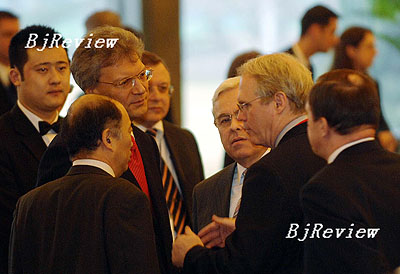
Although the latest round of the six-party talks on the North Korean nuclear issue foundered over a financial matter, negotiators and experts are optimistic that the format ultimately will be successful.
The sixth round of the talks involving North Korea, South Korea, the United States, China, Russia and Japan were adjourned on March 22, as North Korea reportedly refused to discuss nuclear issues until the $25 million of its funds frozen in Banco Delta Asia (BDA), a Macao-based bank, were released.
The United States had imposed sanctions on the bank, which it said was being used by North Korea to launder money. While the United States recently agreed to lift the sanctions and allow an early release of the money, the transaction stalled as some account holders balked at the transaction.
Despite this setback, the six parties agreed that they will continue to advance the process of the talks and reaffirmed that they will carry out the commitments made in a 2005 joint statement and the "Initial Actions" document signed on February 13 this year, under which North Korea agreed to shut down its Yongbyon nuclear facility in return for energy aid.
The money problem
The latest round of the talks actually got off to a good start. North Korea had insisted on resolving the BDA frozen fund issue as a prerequisite for starting other negotiations, and on March 19 the United States agreed to allow the transfer of the money to a North Korean account at the Bank of China (BOC) in Beijing. However, the BOC refused to accept the transfer, according to chief Russian negotiator Alexander Losyukov, who nevertheless noted that the talks were "useful despite the remaining difficulties and disagreements" between the partners on some issues.
The top Chinese envoy to the talks, Wu Dawei, said in Beijing on March 22 that the talks would resume soon, adding that the transfer of funds was an unexpected problem, and all sides were striving to find a solution.
He said the Chinese Government has to discuss with the BOC whether the bank will take the transfer. The BOC has its own concerns and the government should help it solve them.
"All the participants in the talks should show patience, restraint and consistency for securing the nuclear-free status of the Korean Peninsula," Russian Foreign Minister Sergei Lavrov said. "Prudence should be shown and the six-party talks should not be made a hostage to the bilateral problems existing between Washington and Pyongyang."
Meanwhile, White House Spokesman Tony Snow said the delay was "not an issue of American unwillingness," but "a technical issue." He confirmed that the Bush administration hopes the problem will not slow down the six-party talks.
| 